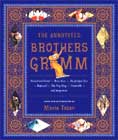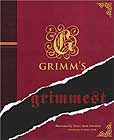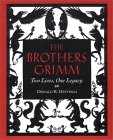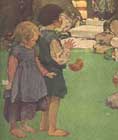
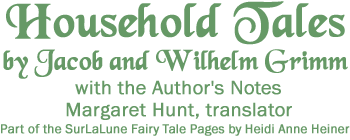
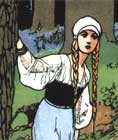
Author's Notes
translated by Margaret Hunt
Return
to
Household Tales:
Table of Contents
Previous
Tale:
The Little Peasant
SurLaLune Fairy Tales Main Page
The
Queen Bee
TWO kings' sons once went out in search of adventures, and fell into a wild, disorderly way of living, so that they never came home again. The youngest, who was called Simpleton, set out to seek his brothers, but when at length he found them they mocked him for thinking that he with his simplicity could get through the world, when they two could not make their way, and yet were so much cleverer. They all three travelled away together, and came to an ant-hill. The two elder wanted to destroy it, to see the little ants creeping about in their terror, and carrying their eggs away, but Simpleton said, "Leave the creatures in peace; I will not allow you to disturb them." Then they went onwards and came to a lake, on which a great number of ducks were swimming. The two brothers wanted to catch a couple and roast them, but Simpleton would not permit it, and said, " Leave the creatures in peace, I will not suffer you to kill them." At length they came to a bee's nest, in which there was so much honey that it ran out of the trunk of the tree where it was. The two wanted to make a fire beneath the tree, and suffocate the bees in order to take away the honey, but Simpleton again stopped them and said, "Leave the creatures in peace, I will not allow you to burn them." At length the three brothers arrived at a castle where stone horses were standing in the stables, and no human being was to be seen, and they went through all the halls until, quite at the end, they came to a door in which were three locks. In the middle of the door, however, there was a little pane, through which they could see into the room. There they saw a little grey man, who was sitting at a table. They called him, once, twice, but he did not hear; at last they called him for the third time, when he got up, opened the locks, and came out. He said nothing, however, but conducted them to a handsomely-spread table, and when they had eaten and drunk, he took each of them to a bedroom. Next morning the little grey man came to the eldest, beckoned to him, and conducted him to a stone table, on which were inscribed three tasks, by the performance of which the castle could be delivered. The first was that in the forest, beneath the moss, lay the princess's pearls, a thousand in number, which must be picked up, and if by sunset one single pearl was wanting, he who had looked for them would be turned into stone. The eldest went thither, and sought the whole day, but when it came to an end, he had only found one hundred, and what was written on the table came to pass, and he was changed into stone. Next day, the second brother undertook the adventure; it did not, however, fare much better with him than with the eldest; he did not find more than two hundred pearls, and was changed to stone. At last the turn came to Simpleton also, who sought in the moss. It was, however, so hard to find the pearls, and he got on so slowly, that he seated himself on a stone, and wept. And while he was thus sitting, the King of the ants whose life he had once saved, came with five thousand ants, and before long the little creatures had got all the pearls together, and laid them in a heap. The second task, however, was to fetch out of the lake the key of the King's daughter's bed-chamber. When Simpleton came to the lake, the ducks which he had saved, swam up to him, dived down, and brought the key out of the water. But the third task was the most difficult; from amongst the three sleeping daughters of the King was the youngest and dearest to be sought out. They, however, resembled each other exactly, and were only to be distinguished by their having eaten different sweetmeats before they fell asleep; the eldest a bit of sugar; the second a little syrup; and the youngest a spoonful of honey. Then the Queen of the bees, which Simpleton had protected from the fire, came and tasted the lips of all three, and at last she remained sitting on the mouth which had eaten honey, and thus the King's son recognized the right princess. Then the enchantment was at an end; everything was released from sleep, and those who had been turned to stone received once more their natural forms. Simpleton married the youngest and sweetest princess, and after her father's death became King, and his two brothers received the two other sisters.
Grimm, Jacob and Wilhelm. Household Tales. Margaret Hunt, translator. London: George Bell, 1884, 1892. 2 volumes.
Notes
From Hesse, where we have also heard another story differing in various ways. A poor soldier offers his services to the King and promises to win for him the most beautiful maiden. He is royally equipped, and on his way, when he passes by a great forest, he hears the song of many thousands of birds resounding delightfully through the blue air. "Halt, halt!" cries he. "The birds must not be disturbed; they are praising their Creator!" and he orders his coachman to turn round, and drives another way. After this he comes to a field where many thousands of ravens are crying loudly for food. He has a horse unharnessed, killed, and thrown for the ravens to eat. At length he comes to a marsh where a fish is lying pitifully lamenting that it cannot reach any flowing water. The soldier himself conveys it to the water, and the fish wags its tail with joy. When he comes to the princess, three tasks are given him, which he must accomplish. In the first place he must gather together again a peck of poppy-seed which the King has had scattered. The soldier takes a measure, a sack, and some white sheets into the field, and spreads out the sheets there. Presently the birds whose singing he would not disturb, come, pick up the seeds, grain by grain, and carry them to the sheets, and the soldier sets before the King the peck which he has had scattered. In the second place he has to fetch a ring which the King's daughter has dropped into the sea. The fish which he had placed in flowing water brings him the ring from under the fin of a whale, where it had fallen. Thirdly, he is to kill a unicorn which has taken up its abode in a forest, and is doing great damage. The soldier goes into the forest, and there the ravens which he rescued from starvation are sitting, and say to him, "Have patience for a little longer, the unicorn has only one good eye, and now he is lying on it, and sleeping; but if he turns round, and sleeps on the bad eye, we will peck out the good one. He will then become furious, but, as he will be blind, he will run against the trees in his fury, and stick fast with his horn." Soon afterwards the animal turns in his sleep, and then he lies on the other side, on which the ravens fly to him, and peck out his good eye. He leaps up and runs against an oak-tree and sticks his horn firmly into it. Then the soldier cuts off his head, carries it to the King, and receives in return for it his beautiful daughter, whom he takes to his master, by whom he is royally rewarded.
In Netherlandish, see The Grateful Animals, No 4. in Wolf's Wodana. In Hungarian, see Gaal, No 8. In Persian, Touti Nameh, No 21 in Iken. A certain King dies and leaves behind him two sons. The elder nsnrps the crown; the second leaves the country. He comes to a pond where a snake has caught a frog. He calls the snake, which leaves hold of the frog, and it hops back into the water. In order to compensate the snake, he cuts off a bit of his own flesh. To show their gratitude for these benefits, both the frog and the snake come to him in human form and serve him. The prince enters into the service of a King, whose ring falls into the water when he is fishing, and who orders the prince to get it out again for him. The frog-man reassumes the form of a frog, goes into the water, and brings out the ring. Soon afterwards the King's daughter is bitten by a snake, and no one can save her from death but the snake-man, who sucks out the poison from the wound. Thereupon the King gives the prince his daughter to wife. And now the two faithful servants take leave of him, and make themselves known to him respectively as the frog whose life he had saved, and the snake to whom he had given a piece of his own flesh to eat. See the story of Livoret (3, 2) in Straparola. In the Jewish Maasähbuch (chap. 143 of Rabbi Chanina), the King first gets to know about the Princess with the Golden Hair, by a single hair which a bird one day (as in Tristan), lets fall on his shoulders, and which it has plucked from her head while she was bathing. On his way Chanina shows kindness to a raven, a dog, and a fish. The tasks set him are to procure water from Paradise and from hell, and the grateful raven brings a small pitcherful from both places. Then he has to get a ring out of the sea. The fish prevails upon Leviathan, who has swallowed it, to spit it out on land, but in the meantime a wild boar comes and swallows it. And now the dog attacks the wild boar and tears it in two pieces, and Chanina again finds the ring. The end is entirely different; for instance, when Chanina has brought the bride home to the King he is taken into high favour by him, and for that reason is murdered by the envious. But the young Queen, who is very much devoted to him, sprinkles him with the water from Paradise, by which be is immediately restored to life. The King wishes to make a trial of this likewise, and orders one of his men to kill him, but the Queen pours the water of hell over him, by which he is immediately burnt to ashes. She says to the people, "See, he was an impious man, or he would have been brought back to life again;" and marries Chanina. There are some more details in Helwig. There is a certain amount of resemblance to Ferdinand the Faithful, No. 126. The story of the White Snake, No. 17, is like this, and so is Soldier Lawrence in Pröhle's Kindermärchen, No 7.
©Heidi
Anne Heiner, SurLaLune Fairy Tales
E-mail: surlalune@aol.com
Page last updated October 15, 2006
www.surlalunefairytales.com





